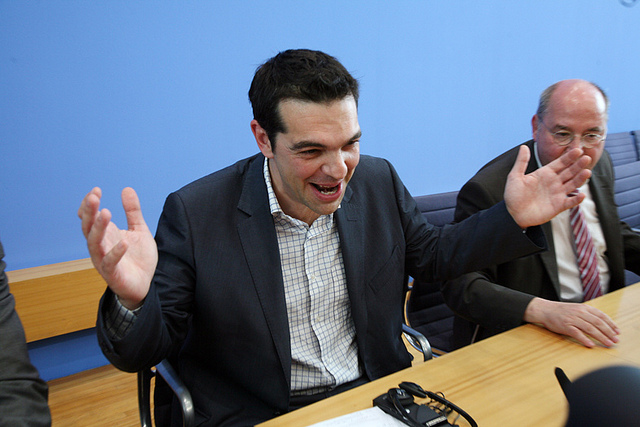 When talks about politics get serious, friends, associates and business partners alike keep wondering about the same thing: “How long do you think this government will last?” My answer is bad and monotonous: “As long as Tsipras allows them to”. Most nod their heads, lost in thoughts about efficiency, organisation and government’s real ability to bring change. A new friend, bright technocrat and former MP (the good sort), when heard it jumped and said: “This is exactly what I answer myself when asked”.
When talks about politics get serious, friends, associates and business partners alike keep wondering about the same thing: “How long do you think this government will last?” My answer is bad and monotonous: “As long as Tsipras allows them to”. Most nod their heads, lost in thoughts about efficiency, organisation and government’s real ability to bring change. A new friend, bright technocrat and former MP (the good sort), when heard it jumped and said: “This is exactly what I answer myself when asked”.
On the other hand, it seems that today’s coalition is -as everybody says- Greece’s last chance to stay in the Eurozone. The fear factor, which was dominant throughout the pre election period and immediately after, worked well with citizens who voted as expected, marginally avoiding the experiment with political radicalism (‘call me Alexis’), and on the other hand giving a weak victory to ND party to force it to cooperate with what is left from the old centre-left.
Later on, government spin efforts replaced fear with hope, with FinMin arguing that we need to try a little bit harder to stay under the Eurozone umbrella, at a time when Europe is about to change. True, but again, not ours. Just like Mario Draghi’s recent intervention: Europe marked it as a new starting point, markets were somehow relieved and Greeks kept trying to figure out how, and if, they were benefited. Greeks know well deep inside that a pathetic -wait and see- stance will bring the country nowhere. Salvation -or, what foreign media keep calling bailout- strategy will depend on initiatives taken from within. So, the motto we should, perhaps, stick to is that the solution “is in our hands”.
Alexis Tsipras knows well that Antonis Samaras will play the troika game, take the heat and hope for some positive results when the boat starts turning, to feed new political talk towards re-election. To reach that, Samaras’ led coalition will have to go through hell; opinion polls will make things even worse.
Alexis Tsipras knows that when the slow Greek boat starts turning, his chances to attack will be numbered. By then he hopes to have a decent political rhetoric, along with the necessary professionalism to turn a wave into government.
Tsipras also knows that Samaras’ staffers are average, cabinet members are of the past, whilst the quotas the Premier had to take in from his coalition partners seem politically helpless. However, the Premier seems determined to save face, along with the reputation of his generation.
Things do not come easy though. Nearly 100 days after the elections, the government continues to staff key positions and is still trying to figure out “equivalent measures” to avoid horizontal cuts, a political bubble that troika wishes to put to rest next to the “renegotiation” rhetoric.
For those who can view Greece from a distance, what they see is from one hand troika (EC-ECB-IMF) people moving in high gear, pushing for the only thing Greeks can accomplish (namely withhold people’s money in the source) and from the other, the leftovers of the previous political system dragged in a battle 2 out of 3 of them appear unwilling to fight. Hence the differences: Antonis seems determined to fire at the enemy before dying in the barracks, Evangelos may eventually save his life as a disgraced HQ clerk, while Fotis is about to catch a stray bullet, while wandering disoriented in no man’s land.
Despite all, the future has presented itself. After the old generation manages to reach its redemption, new politicians (of a different sort) should come forward to take it from there. And here is the most important thing Tsipras knows. If his new competition is once again old school, he will prevail; big time.
Thus, for people to gain from political competition, common sense dictates that new ‘Tsiprases’ should appear to reposition Greek politics (hopefully closer to Europe) and move the country forward. But the process is going to be bloody.

